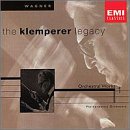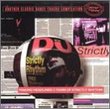| All Artists: Otto Klemperer, Philharmonia Orchestra Title: Klemperer Legacy - Wagner: Orchestra Music, Vol. 1 / Philharmonia Orchestra Members Wishing: 0 Total Copies: 0 Label: EMI Classics Imports Release Date: 9/8/1998 Genre: Classical Styles: Opera & Classical Vocal, Historical Periods, Modern, 20th, & 21st Century, Symphonies Number of Discs: 1 SwapaCD Credits: 1 UPC: 724356680524 |
Search - Otto Klemperer, Philharmonia Orchestra :: Klemperer Legacy - Wagner: Orchestra Music, Vol. 1 / Philharmonia Orchestra
 | Otto Klemperer, Philharmonia Orchestra Klemperer Legacy - Wagner: Orchestra Music, Vol. 1 / Philharmonia Orchestra Genre: Classical
|
Larger Image |
CD DetailsSimilar CDs
|
CD ReviewsAT LAST, KLEMPERER'S WAGNER CONCERTS IN CLEAR RECORDINGS R. Q. Hofacker Jr. | Basking Ridge, NJ USA | 01/21/2002 (4 out of 5 stars) "What a difference! The original stereo LP pressings of these grand performances by Otto Klemperer and EMI's Philharmonia Orchestra were a big disappointment for me when I bought them in 1972. The problem seemed to lie in the mastering, so even the most fabulous pressing technology could not reproduce the original sound. I bought several other vinyl LP pressings (1985) issued by EMI's German branch, which were labeled "Direct Metal Mastering" and "Digitally Remastered," but those still lacked the depth and range of other Klemperer/Philharmonia recordings in my collection. But in 1998, at last, somebody at EMI succeeded in remastering and transferring the original analog tapes to compact disc, using 24-bit digital technology to capture the true open sound of Kingway Hall in London, where these recordings were made between Feb. 23rd and March 2, 1960. According to the liner notes in a handsome booklet issued with the two vinyl LPs in 1960, "the recordings were made simultaneously for the stereo and mono versions. Two separate systems of microphones and tape recorders were used, necessitating of course, separate control rooms and different engineers -- a penalty imposed on the record industry by progress, in the form of stereo recording. The technique for recording the stereo version involved the use of crossed and spaced microphones. That is to say, one pair of microphones linked together to cover the full width of the orchestra with supplementary microphones placed to capture the sound of various sections. This technique produces a close approximation to the sound actually heard at a concert in the best seat of an auditorium." (I wonder whether the mono tapes were combined with the stereo tapes in the remastering for CD?) The LPs did not live up to the hype. The best thing about the Angel Stereo 3610 2-LP album was the box itself and the fascinating 12-page (full-size) booklet, "specially produced to mark the occasion of the 75th birthday of Dr. Otto Klemperer, May 14, 1960." Included in the booklet was a reproduction of the handwritten compliment by Wieland Wagner (dated March 15, 1960) in which he noted: "Classical Greece, Jewish tradition, medieval christendom, German romanticism and the realism of our time are all combined in this man and make Klemperer the conductor a unique artistic phenomenon." Wieland Wagner was Richard Wagner's grandson. Because Richard Wagner was a virulent and outspoken anti-Semite, his grandson's praise probably caused him to spin in his grave. But Klemperer, despite his birth as a Jew and his persecution by the Nazis in 1933, held no compunction about performing Wagner's music. Born in 1885 in Breslau, Klemperer converted to Catholicism in 1919 at age 34 when he married soprano Jennie Gaissler, a Catholic. However, he held dual West German and Israeli citizenship when he died at age 88 on July 6, 1973 in Zurich, Switzerland. He is interred in Zurich's Jewish cemetery. Klemperer's career was actually divided into three careers: 1909 to 1933 in Czechoslovakia and Germany, 1934 to 1954 in the U.S. and Europe, and 1954 to 1973 in Great Britain as the principal conductor of The Philharmonia Orchestra. At the age of 70, in 1954 Klemperer was sought out by the legendary EMI record producer, Walter Legge, to head up a world-class orchestra Legge was assembling for EMI. The Philharmonia became Klemperer's third career. By this time, Toscanini and Furtwängler were dead, so Klemperer became the dominant interpreter of the Austro-German repertoire, recording in stereo many works by Bach, Haydn, Mozart, Beethoven, Brahms, Mendelssohn and Mahler. The Wagner recordings on this CD precede his 1968 recording of "Der fliegende Holländer" ("The Flying Dutchman"), regarded by many critics as one of the "Great Recordings of the Century." And why not? Klemperer's work with Wagner's scores stretched over more than 50 years. Actually, his career(s) spanned the development of recording technology all the way from early acoustic recordings, through the 78-rpm shellac era, and on through the mono vinyl LPs to the stereo LPs, just missing the introduction of digital recording. These recordings have been issued and reissued several times, but I wouldn't count on them being permanently available in the catalog. I recommend them most highly, especially if, like me, you bought the original LPs and were disappointed in those." Don't wait for this to be cut from circulation. John Peters | Austin, TX | 09/23/2002 (5 out of 5 stars) "The recording of these overtures (along with the second volume of Wagner works under the same Klemperer Legacy title) are by no means in the style and manner that Wagner would have prefered. Wagner always complained that his music was performed too slow and he would have undoubtedly leveled the same charge here. That does not automatically mean that the composer is correct and the conductor is wrong. Quite the contrary. The performances here leave a powerful impression on the listener. Klemperer pushes the orchestra to the limit with great authority. Unlike many other Wagner conductors, Klemperer does not suppress his string section at all (many conductors let their brass sections drown out the strings). This is most noticeable in Der Fliegende Hollander and Tannhauser. These are both a tour de force. Klemperer lets the his strings soar to incredible heights and the result is terribly exciting, and yet he is still able to have them work harmonously with his brass. The prelude to Act 3 of Lohengrin is a powerful brass erruption but again the strings can be vivedly heard. The effect is still the same. The recordings of the works from Meistersinger are interesting in the fact that they follow Klemperer's traditional playing style. They are slower than most performances and the orchestra plays like a large chamber group. However, they do not loose their power. As the title of the review suggests, buy this before the publisher makes it unavailable. EMI is notorious for slashing great recordings. This is certainly a great one." Old klemp does well Baker Sefton Peeples | Santa Cruz, CA United States | 08/01/2001 (4 out of 5 stars) "Klemperer was Jewish, but this certainly did not affect his conducting of wagner, which is very good indeed. His Flying Dutchman and Tannhauser overtures are incredibly exciting and quite frankly my favorite renditions of each. The Lohengrin overture is rapt and shimmering, and his act III intro is not a mad dash to the finish line as most conduct it, but still a joyous introduction to the wedding march that follows. The Meistersinger excerpts are truly astonishing. His overture is possibly the slowest ever recorded, but nothing is lacking. He even pays attention to counterpoint and highlights it where his colleagues like Solti race through and aim for a kind of orgasm in every bar. Listen to the place where wagner has the meistersinger theme played with the prize song melody with the second violins doing their own thing. Amazing how clear it is. His dances certainly do that as well. very good recordings."
|

 Track Listings (7) - Disc #1
Track Listings (7) - Disc #1
